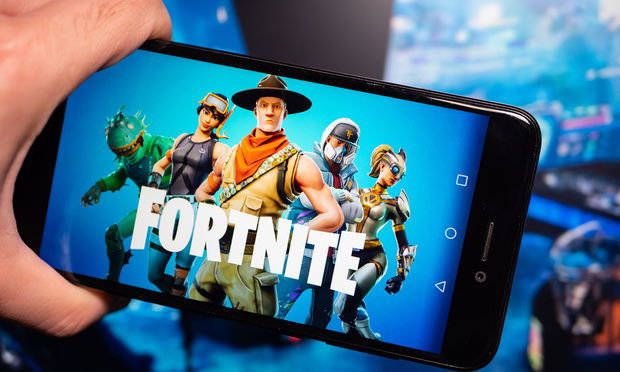Sax Player's Suit Against Fortnite Maker Over 'Signature Move' Reduced to 1 Count
U.S. District Judge John Padova granted Epic's motion for dismissal on seven of eight causes of action in the lawsuit filed by musician Leo Pellegrino, a Pittsburgh native who plays baritone sax in the group Too Many Zooz.
March 31, 2020 at 04:29 PM
3 minute read
 Photo: Shutterstock.com
Photo: Shutterstock.com
A saxophone player whose music went viral in a 2014 YouTube video and who sued Epic Games over claims that the company is using his "signature" dance moves in Fortnite Battle Royale can move forward with his lawsuit on a single claim.
U.S. District Judge John Padova of the Eastern District of Pennsylvania granted Epic's motion for dismissal on seven of eight causes of action in the lawsuit filed by musician Leo Pellegrino, a Pittsburgh native who plays baritone sax in the group Too Many Zooz.
Pellegrino's Lanham Act false endorsement claim was the sole one to proceed. Padova said Pellegrino has the opportunity to amend his claims.
Since becoming a hit on YouTube, the group has been featured in several TV commercials and has worked with recording artists, including Beyonce. Pellegrino claimed Epic made an unauthorized use of his likeness in an "emote" dance, which can be used by characters in the video game.
Epic's defense largely centered on Fortnite being a creative work protected by the First Amendment, according to Padova's opinion. Padova looked to the Third Circuit's decision in Hart v. Electronic Arts for guidance. In that case, the court held that an expressive work is protected if the celebrity's likeness is so transformed that it becomes the defendant's own expression.
"Epic argues that its use of Pellegrino's likeness in Fortnite (allowing Fortnite avatars to be equipped with the Signature Move a.k.a. the Phone It In emote) is so transformative that the likeness has become primarily Epic's own expression rather than Pellegrino's likeness," Padova said. "Applying the test as articulated in Hart, we observe that the complaint does not allege that the Fortnite avatars equipped with the Phone It In emote, i.e., Pellegrino's likeness, share Pellegrino's appearance or biographical information. Indeed, the complaint contains a picture of a Fortnite avatar equipped with the Phone It In emote, and the avatar does not bear a strong resemblance to Pellegrino."
Pellegrino's complaint also claimed that by allegedly replicating his signature move in Fortnite, Epic has misappropriated his likeness and trademark, in violation of the Lanham Act.
Padova agreed to dismiss the first component of that claim, false designation. But he denied Epic's request to dismiss the false endorsement claim, reasoning that it is not barred.
"Epic named the emote 'Phone It In' to 'allude[] to Pellegrino's appearance in a Google Pixel 2 phone commercial in 2017," Padova said reciting the allegations. "'The reaction from many players worldwide was immediate recognition of the emote as embodying the Signature Move'; and, as a result of Epic's alleged use of 'Pellegrino's likeness and the Signature Move,' Epic has 'creat[ed] the false impression that Pellegrino endorse[s] Fortnite.' These allegations relate to Epic's use of Pellegrino's likeness and trademark to create the impression that Pellegrino endorses Fortnite and do not relate to the alleged confusion over the origin of the Signature Move."
Pellegrino is represented by Andrew Lorin of Pierce Bainbridge Beck Price & Hecht. Epic is represented by Dale Cendali of Kirkland & Ellis. Neither responded to requests for comment.
This content has been archived. It is available through our partners, LexisNexis® and Bloomberg Law.
To view this content, please continue to their sites.
Not a Lexis Subscriber?
Subscribe Now
Not a Bloomberg Law Subscriber?
Subscribe Now
NOT FOR REPRINT
© 2025 ALM Global, LLC, All Rights Reserved. Request academic re-use from www.copyright.com. All other uses, submit a request to [email protected]. For more information visit Asset & Logo Licensing.
You Might Like
View All
Saul Ewing Loses Two Partners to Fox Rothschild, Marking Four Fla. Partner Exits in Last 13 Months
3 minute read


Feasting, Pledging, and Wagering, Philly Attorneys Prepare for Super Bowl
3 minute readLaw Firms Mentioned
Trending Stories
- 1ACC CLO Survey Waves Warning Flags for Boards
- 2States Accuse Trump of Thwarting Court's Funding Restoration Order
- 3Microsoft Becomes Latest Tech Company to Face Claims of Stealing Marketing Commissions From Influencers
- 4Coral Gables Attorney Busted for Stalking Lawyer
- 5Trump's DOJ Delays Releasing Jan. 6 FBI Agents List Under Consent Order
Who Got The Work
J. Brugh Lower of Gibbons has entered an appearance for industrial equipment supplier Devco Corporation in a pending trademark infringement lawsuit. The suit, accusing the defendant of selling knock-off Graco products, was filed Dec. 18 in New Jersey District Court by Rivkin Radler on behalf of Graco Inc. and Graco Minnesota. The case, assigned to U.S. District Judge Zahid N. Quraishi, is 3:24-cv-11294, Graco Inc. et al v. Devco Corporation.
Who Got The Work
Rebecca Maller-Stein and Kent A. Yalowitz of Arnold & Porter Kaye Scholer have entered their appearances for Hanaco Venture Capital and its executives, Lior Prosor and David Frankel, in a pending securities lawsuit. The action, filed on Dec. 24 in New York Southern District Court by Zell, Aron & Co. on behalf of Goldeneye Advisors, accuses the defendants of negligently and fraudulently managing the plaintiff's $1 million investment. The case, assigned to U.S. District Judge Vernon S. Broderick, is 1:24-cv-09918, Goldeneye Advisors, LLC v. Hanaco Venture Capital, Ltd. et al.
Who Got The Work
Attorneys from A&O Shearman has stepped in as defense counsel for Toronto-Dominion Bank and other defendants in a pending securities class action. The suit, filed Dec. 11 in New York Southern District Court by Bleichmar Fonti & Auld, accuses the defendants of concealing the bank's 'pervasive' deficiencies in regards to its compliance with the Bank Secrecy Act and the quality of its anti-money laundering controls. The case, assigned to U.S. District Judge Arun Subramanian, is 1:24-cv-09445, Gonzalez v. The Toronto-Dominion Bank et al.
Who Got The Work
Crown Castle International, a Pennsylvania company providing shared communications infrastructure, has turned to Luke D. Wolf of Gordon Rees Scully Mansukhani to fend off a pending breach-of-contract lawsuit. The court action, filed Nov. 25 in Michigan Eastern District Court by Hooper Hathaway PC on behalf of The Town Residences LLC, accuses Crown Castle of failing to transfer approximately $30,000 in utility payments from T-Mobile in breach of a roof-top lease and assignment agreement. The case, assigned to U.S. District Judge Susan K. Declercq, is 2:24-cv-13131, The Town Residences LLC v. T-Mobile US, Inc. et al.
Who Got The Work
Wilfred P. Coronato and Daniel M. Schwartz of McCarter & English have stepped in as defense counsel to Electrolux Home Products Inc. in a pending product liability lawsuit. The court action, filed Nov. 26 in New York Eastern District Court by Poulos Lopiccolo PC and Nagel Rice LLP on behalf of David Stern, alleges that the defendant's refrigerators’ drawers and shelving repeatedly break and fall apart within months after purchase. The case, assigned to U.S. District Judge Joan M. Azrack, is 2:24-cv-08204, Stern v. Electrolux Home Products, Inc.
Featured Firms
Law Offices of Gary Martin Hays & Associates, P.C.
(470) 294-1674
Law Offices of Mark E. Salomone
(857) 444-6468
Smith & Hassler
(713) 739-1250





